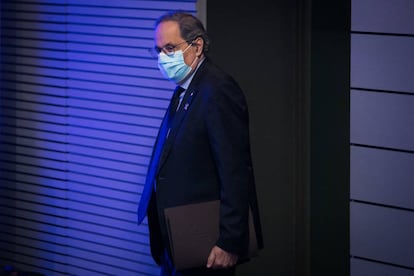Catalonia bans social gatherings of more than 10 people in bid to slow coronavirus spread
Madrid has ruled out introducing a similar measure and has instead called on residents to limit non-essential interactions


The premier of Catalonia, Quim Torra, announced on Monday a raft of new restrictions aimed at curbing the spread of coronavirus cases in the region before students return to school on September 14.
“In these three weeks, we are staking everything that could happen in the fall and the winter,” he said.
The toughest restriction announced by Torra is a ban on social gatherings of more than 10 people across the region, with the exception of work meetings and when traveling.
The regional government in Murcia also announced on Monday that social gatherings would be limited to a maximum of six people if they do not live together, Virginia Vadillo reports.
We are facing a health, economic and social problem, and now we are also facing an education emergencyCatalan premier Quim Torra
For the past week, the regional government in Catalonia has been warning that a great collective effort is needed to slow the transmission of the virus. After stabilizing for a few weeks, the number of cases is once again on the rise in the northeastern region.
“We are no longer in a stable position, [cases] are persistently rising,” said Torra.
The spike in contagion is of concern to the regional government, which wants to guarantee that schools will reopen in September and that workers will be able to return to their jobs.
The risk of a Covid-19 outbreak in Catalonia, according to the growth potential index (EPG) and regional figures, is at 180.13 – 20 points higher than at the beginning of August, and much higher than the 100-point threshold used to classify “high” risk. The rate of transmission (Rt) is at 1.12, meaning one case will infect an average of 1.12 people. There are currently 672 coronavirus patients in hospital and 134 in intensive care – an increase from the figures reported two weeks ago. This month, regional health authorities have carried out more than 21,000 PCR tests in different neighborhoods and communities in a bid to identify asymptomatic cases and break the chain of transmission. Of these tests, 512 asymptomatic cases have been detected, representing 2.4% of the total.
There are currently 672 coronavirus patients in hospital and 134 in intensive care in Catalonia
However the mass testing and restrictions announced up till now have not been enough to curb the rising number of cases. “We have to ask again for a new effort. We are facing a health, economic and social problem, and now we are also facing an education emergency. We need our children and young people to return to school. If this doesn’t happen, the country will not work,” said Torra.
The premier explained that 70% of the cases currently detected in Catalonia happened at social gatherings with friends and family. In a bid to cut this rate, the Catalan regional government has banned social gatherings of more than 10 people – a measure that was already introduced last week in the city of Reus in Tarragona province.
Social distancing measures, the mandatory use of face masks, the ban on smoking and drinking in public spaces, the closure of nighttime venues and reduced hours for bars and restaurants will also be maintained in the region.
Torra also revealed on Monday the protocol for the reopening of schools, which have been closed to most students since the Spanish government declared a state of alarm in mid-March. The guidelines, which will be formally announced tomorrow, include reduced class sizes and the mandatory use of face masks.
Without going into details, the premier said that classes will be reduced to 20 students in primary school and “much smaller groups” in secondary school and Bachillerato, which is prior to university.
With respect to face masks, the safety measure will be mandatory for students over the age of 12 and over the age of six, if the pupil is in an at-risk category. Torra also called on Spanish Prime Minister Pedro Sánchez to “immediately” approve a subsidy to help families manage if a student tests positive for Covid-19 and has to quarantine at home.
Madrid awaiting ruling on restrictions
The regional government of Madrid has for now rejected reintroducing confinement measures that would limit economic activity and instead called on residents to avoid non-essential “social interactions.”
Speaking during an interview on Monday with radio station Cadena SER, justice department chief Enrique López said: “It’s not about returning to confinement that restricts economic activity to the point of suspending it or work. It’s about avoiding as much as possible unnecessary social interaction.”
The Madrid government has, however, ordered all bars and restaurants in the municipality of Tielmes (2,700 residents) to close for 14 days. The order was published on Sunday in Madrid’s Official State Gazette after a rise in coronavirus cases was detected in the area. López said that there is a “risk of community contagion” in Tielmes, which is the first municipality in Madrid to be subject to such restrictions.
In the meantime, regional authorities continue to await the ruling from Madrid’s High Court on whether it is allowed to ban smoking in public when two-meter distance cannot be respected, and close nighttime bars and nightclubs. These orders were annulled on Friday by the administrative court in Madrid on the grounds that they referenced a Health Ministry order that had not yet been published in the Official State Gazette.
English version by Melissa Kitson.
Tu suscripción se está usando en otro dispositivo
¿Quieres añadir otro usuario a tu suscripción?
Si continúas leyendo en este dispositivo, no se podrá leer en el otro.
FlechaTu suscripción se está usando en otro dispositivo y solo puedes acceder a EL PAÍS desde un dispositivo a la vez.
Si quieres compartir tu cuenta, cambia tu suscripción a la modalidad Premium, así podrás añadir otro usuario. Cada uno accederá con su propia cuenta de email, lo que os permitirá personalizar vuestra experiencia en EL PAÍS.
¿Tienes una suscripción de empresa? Accede aquí para contratar más cuentas.
En el caso de no saber quién está usando tu cuenta, te recomendamos cambiar tu contraseña aquí.
Si decides continuar compartiendo tu cuenta, este mensaje se mostrará en tu dispositivo y en el de la otra persona que está usando tu cuenta de forma indefinida, afectando a tu experiencia de lectura. Puedes consultar aquí los términos y condiciones de la suscripción digital.








































